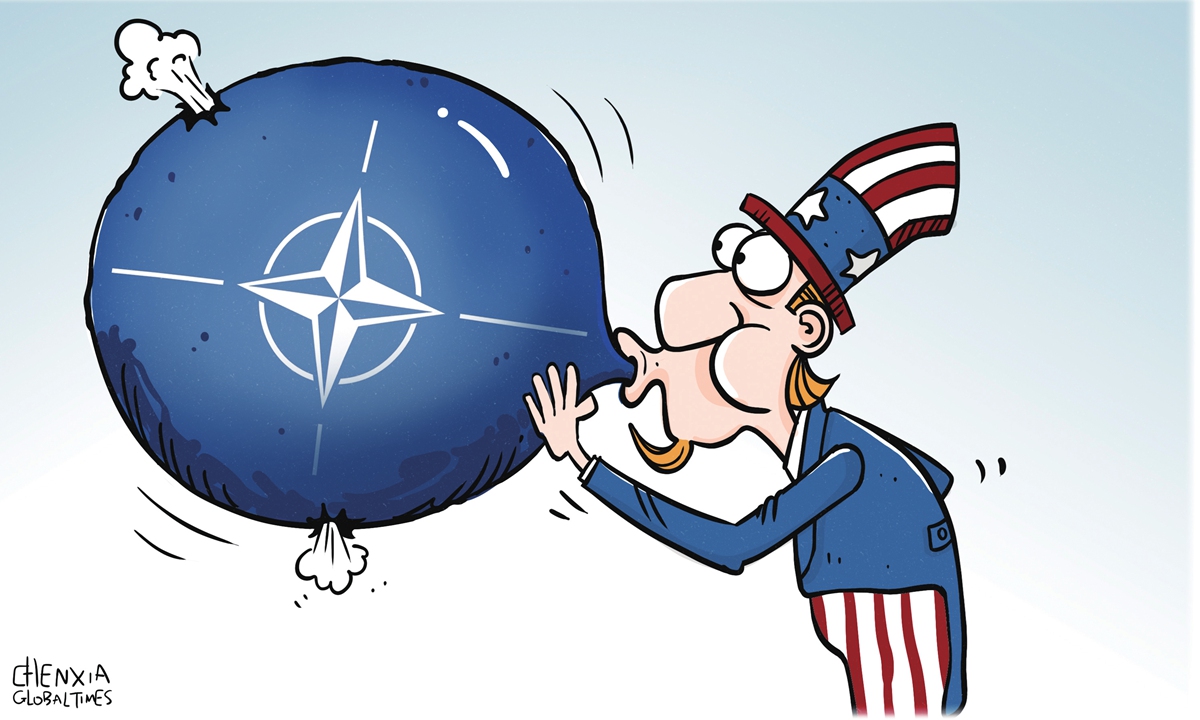
NATO Illustration: Chen Xia/Global Times
The NATO summit kicked off on June 28 in Madrid, Spain. In the eyes of onlookers, the bloc - the product of the old Cold War - is lifting the curtain on a "new cold war." An article in Foreign Policy, published on Monday, articulated that "another, very different sort of cold war is beginning… as we will see at the NATO summit in Madrid - where the leaders of Japan, South Korea, Australia, and New Zealand will join the gathering for the first time - new battle lines are being drawn that could last for generations." This somewhat pessimistic judgment reflects the international community's general concern about the current situation.
Relevant reports, almost without exception, all said that China will be listed a "challenge" for the first time in NATO's so-called new Strategic Concept. US National Security Advisor Jake Sullivan said NATO's strategy paper would "speak in ways that are unprecedented about the challenge that China poses." But in terms of how to describe China, intense discussions are underway among NATO members.
It is said that, unlike the US and UK's radical attitude toward China, countries such as France and Germany believe that more measured and cautious terms should be used to describe China. French President Emmanuel Macron previously warned that "we shouldn't bias our relationship with China." Some diplomats from Lithuania and Portugal also expressed concerns about focusing too much on China, as NATO countries do not share a single border with China. This "fierce discussion" itself is enough to show how absurd the rhetoric of "China threatens NATO" is.
NATO has 30 member states, and their demands on interests and external attitudes cannot be the same, but Washington's strategic will is increasingly coercing and is kidnapping NATO. This makes countries that seek security guarantees by joining NATO often become vassals or pawns of Washington. In the end, their security environment will not fundamentally improve. They will face unpredictable worsening risks. In any case, NATO cannot change the nature of being a military and political bloc. Its very existence poses a threat to world peace and stability.
Mencius, an ancient Chinese philosopher, once said that a gentleman does not stand under a dangerous wall. To some extent, it can be said that NATO is the biggest "dangerous wall" in the world today.
NATO directly caused and continuously strengthened Europe's security dilemma and the outbreak of the Russia-Ukraine conflict is a manifestation of its disastrous consequences. Facts have proven that the extreme pursuit of absolute security under the name of collective defense will eventually lead to confrontation between camps. In other words, NATO is by no means an antidote to Europe's security crisis, but poison. If anyone spreads such poison to East Asia, which is called "the oasis of world peace and development," the behavior is insidious and appalling.
Whatever the reason, Japan, South Korea, Australia and New Zealand, especially Japan and South Korea, should not be present at the NATO summit. This is a very negative move. What can participation in this transatlantic military and political gathering with a strong Cold War characteristic and strong hostility toward China bring to these Asia-Pacific countries? What will they lose? It's not difficult to figure out.
The countries that are moving toward NATO, either actively or passively, may gain a few compliments from Washington, and make somewhat connections with the military bloc. However, the interests of Asia-Pacific countries are based on the peace and stability of the region. Catering to NATO's Asia-Pacificization is tantamount to inviting wolves into the house. It's an extremely unwise choice for any Asia-Pacific country and is bound to damage that country's strategic trust with China, inevitably leading to consequences.
The sewage of the Cold War cannot be allowed to flow into the Pacific Ocean - this should be the general consensus in the Asia-Pacific region.
If countries closely interact with NATO while intentionally or intentionally bringing Cold War into the Asia-Pacific, they will be no different to those people who insist on not driving drunk despite the fact they do. Europe's security is at a complicated impasse and all parties are still trying to find a solution. Asia-Pacific countries must learn lessons from Europe from a right angle.
In general, all tendencies shown at this NATO summit are wrong and dangerous. For Asia-Pacific countries, keeping vigilance against and opposing the Asia-Pacificization of NATO is a due task to keep their eyes open and tell right from wrong. There is no room for speculation.




